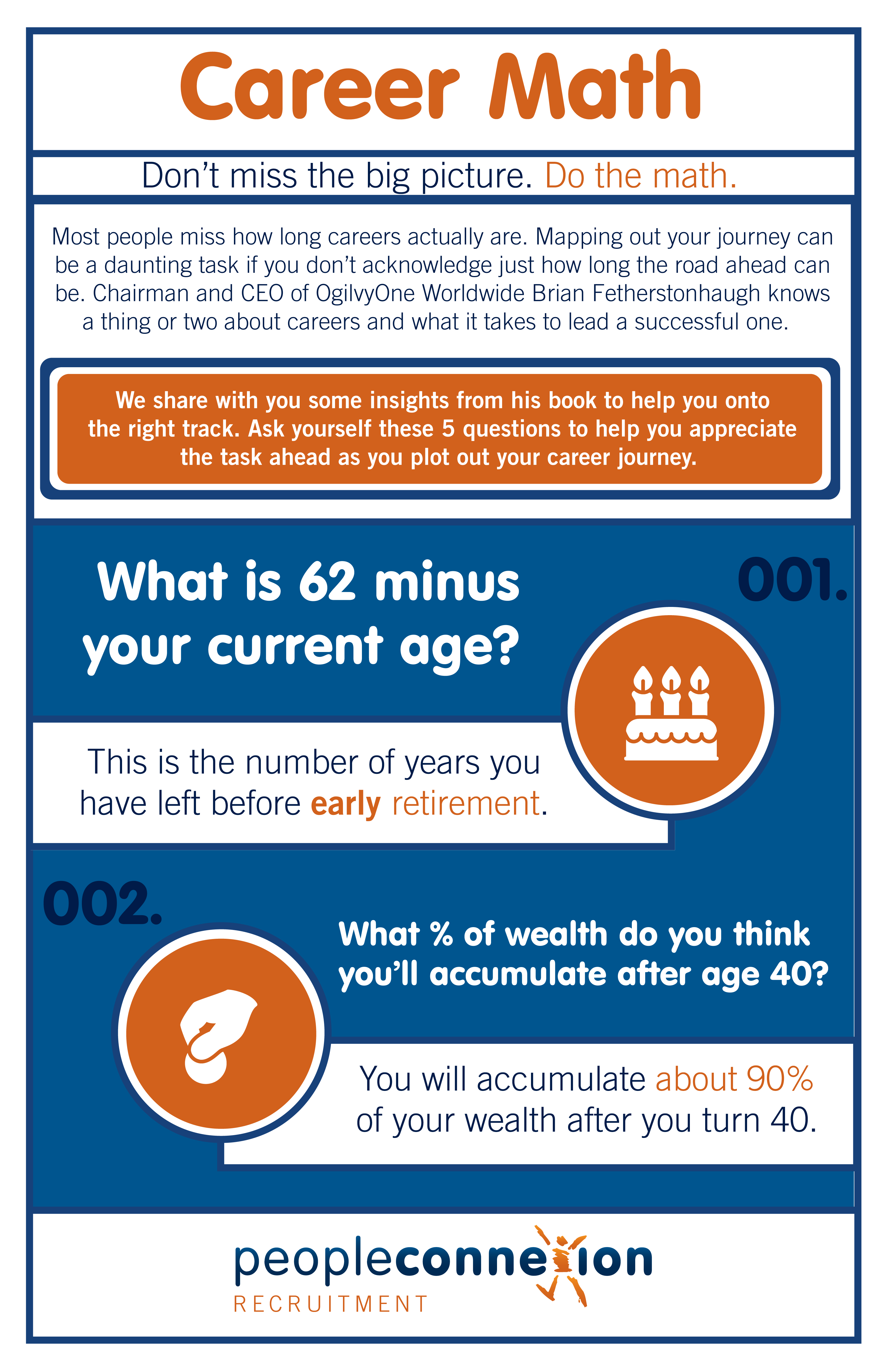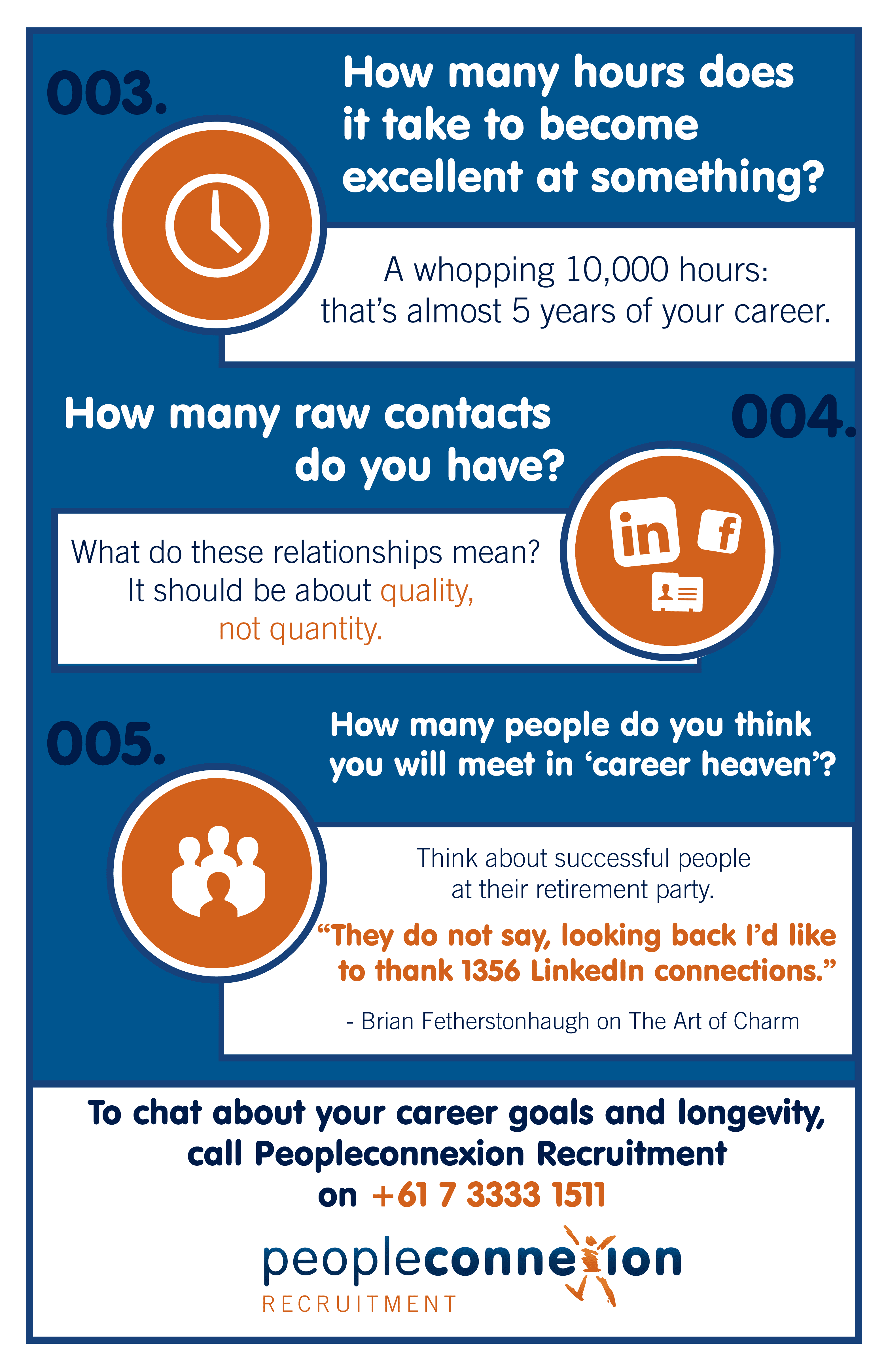Mapping out your career can be a daunting task, whether you’re just starting out, looking to re-enter the workforce or ready to progress the path you’re already on. What can be even more overwhelming is truly understanding how long your career is and pacing yourself so that you can go the distance without burning yourself out. Estimates put the cost of burnt out employees at over $14.8 billion dollars per year, a true sign of workers sacrificing their health and happiness. When you can see past just the next six or twelve months, you can understand the importance of goal-setting, pacing yourself and creating strong networks to last you until you can kick up your heels and retire.
We share with you a five-minute exercise you can do to help you assess your career’s health and longevity.
Career Math
At Peopleconnexion, we’ve seen just about every career book on the shelf ? but we are loving CEO of OgilvyOne Worldwide’s take on careers in The Long View: Career Strategies to Start Strong, Reach High and Go Far. In his book, he describes the concept of ?career math?.
?Career math is a couple of very simple questions I encourage people to ask themselves, the answers can be quite enlightening? ? Brian Fetherstonhaugh
-
What is 62 minus your current age?
Deduct your current age from 62: this is the number of years you have left before early retirement. If you’re still in your 20s or 30s, you can really appreciate just how long you have left in your career and the need to pace yourself to avoid burning out.
-
What percentage of wealth do you think you will accumulate after you’re 40?
What did you estimate? 40 percent? 60 percent? On average, you will actually accumulate approximately 90 percent of your personal wealth after age 40. The act of building wealth is back-end heavy, so you must ensure you are setting yourself up with the skills you need while you are younger. Keep this in mind as you make decisions and progress forward.
-
How many hours does it take to become excellent at something?
In his book, Fetherstonhaugh estimates that it takes about 10,000 hours to master a skill. That is almost 5 years of your career! It is important to make sure the skills you are building and the knowledge you acquire can be transferred to new environments, new positions and can propel you through any organisational challenge or economic downturn. Perhaps most importantly, you must ask yourself whether those 10,000 hours of practice are helping you achieve your professional goals ? if you are spending time developing a skill without developing yourself, you may need to reconsider how you can put plans in place to prioritise and change your current path.
-
How many raw contacts do you have?
If you had to add together your LinkedIn contacts, Facebook friends and contacts in your phone, how many would you have? You may find this number is in the thousands. We are constantly in contact with people every day and always looking to expand our social and professional circles ? but how valuable is this? How many people on your lists can you point to and explain how they have positively influenced you and your career? How many do you actually keep in close contact with and nurture relationships with?
-
How many people do you think you will meet in ?career heaven??
Think of ?career heaven? as the place you go when you reach retirement containing all of the people that have really shaped your career and been your champion along the way. Who do you think you will see in ?career heaven?? You will probably be able to count the number of people on one hand. Notice the difference between the number you reached in the previous question and this one. While we may get caught up on our number of raw contacts, our relationships should be about quality, not quantity.
Now is the time to do the math and start to reshape your outlook for 2017. Is your career heading in the right direction and aligned with your professional goals? Are you pacing yourself and working on creating transferable skills?
– Kristine Berry, Director

